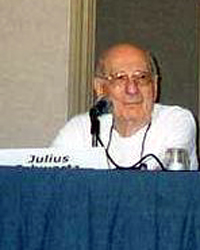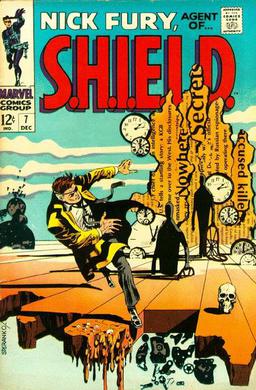Silver Age of Comic Books
== Silver Age of Comic Books ==
The Silver Age of Comic Books is a period in the history of American comic books that began in the late 1950s and lasted until the early 1970s. This era followed the Golden Age of Comic Books and preceded the Bronze Age of Comic Books. The Silver Age is noted for the revival of the superhero genre and the introduction of many iconic characters and teams.
Historical Context[edit | edit source]
The Silver Age began with the publication of DC Comics' Showcase #4 in 1956, which featured the first appearance of the modern version of The Flash. This marked a resurgence of interest in superhero comics, which had waned after World War II. The success of Showcase #4 led to the reintroduction of other Golden Age heroes and the creation of new ones.
Key Publishers[edit | edit source]
The two major publishers during the Silver Age were DC Comics and Marvel Comics. DC Comics revitalized its superhero lineup with new versions of characters like Green Lantern, Hawkman, and the Justice League of America. Marvel Comics, under the leadership of Stan Lee, Jack Kirby, and Steve Ditko, introduced a new wave of superheroes, including Spider-Man, The Fantastic Four, The X-Men, and The Avengers.
Notable Characters and Teams[edit | edit source]
- The Flash - The character that sparked the Silver Age.
- Green Lantern - A new version of the Golden Age hero.
- Justice League of America - A team of superheroes that included Superman, Batman, Wonder Woman, The Flash, Green Lantern, Aquaman, and Martian Manhunter.
- Spider-Man - Created by Stan Lee and Steve Ditko, Spider-Man became one of the most popular superheroes of all time.
- The Fantastic Four - Created by Stan Lee and Jack Kirby, this team marked the beginning of the Marvel Universe.
- The X-Men - Another creation of Stan Lee and Jack Kirby, featuring mutants with extraordinary powers.
- The Avengers - A team of superheroes including Iron Man, Thor, Hulk, and Captain America.
Cultural Impact[edit | edit source]
The Silver Age of Comic Books had a significant impact on popular culture. The characters and stories from this era have been adapted into numerous television shows, films, and video games. The era also saw the rise of comic book fandom, with the first comic book conventions and fan clubs.
End of the Silver Age[edit | edit source]
The Silver Age is generally considered to have ended in the early 1970s, with the publication of more socially conscious and darker stories. This transition is marked by the publication of Green Lantern/Green Arrow by Dennis O'Neil and Neal Adams, which addressed issues such as drug addiction and social justice.
Related Pages[edit | edit source]
- Golden Age of Comic Books
- Bronze Age of Comic Books
- Modern Age of Comic Books
- DC Comics
- Marvel Comics
- Stan Lee
- Jack Kirby
- Steve Ditko
Search WikiMD
Ad.Tired of being Overweight? Try W8MD's NYC physician weight loss.
Semaglutide (Ozempic / Wegovy and Tirzepatide (Mounjaro / Zepbound) available. Call 718 946 5500.
Advertise on WikiMD
|
WikiMD's Wellness Encyclopedia |
| Let Food Be Thy Medicine Medicine Thy Food - Hippocrates |
Translate this page: - East Asian
中文,
日本,
한국어,
South Asian
हिन्दी,
தமிழ்,
తెలుగు,
Urdu,
ಕನ್ನಡ,
Southeast Asian
Indonesian,
Vietnamese,
Thai,
မြန်မာဘာသာ,
বাংলা
European
español,
Deutsch,
français,
Greek,
português do Brasil,
polski,
română,
русский,
Nederlands,
norsk,
svenska,
suomi,
Italian
Middle Eastern & African
عربى,
Turkish,
Persian,
Hebrew,
Afrikaans,
isiZulu,
Kiswahili,
Other
Bulgarian,
Hungarian,
Czech,
Swedish,
മലയാളം,
मराठी,
ਪੰਜਾਬੀ,
ગુજરાતી,
Portuguese,
Ukrainian
Medical Disclaimer: WikiMD is not a substitute for professional medical advice. The information on WikiMD is provided as an information resource only, may be incorrect, outdated or misleading, and is not to be used or relied on for any diagnostic or treatment purposes. Please consult your health care provider before making any healthcare decisions or for guidance about a specific medical condition. WikiMD expressly disclaims responsibility, and shall have no liability, for any damages, loss, injury, or liability whatsoever suffered as a result of your reliance on the information contained in this site. By visiting this site you agree to the foregoing terms and conditions, which may from time to time be changed or supplemented by WikiMD. If you do not agree to the foregoing terms and conditions, you should not enter or use this site. See full disclaimer.
Credits:Most images are courtesy of Wikimedia commons, and templates, categories Wikipedia, licensed under CC BY SA or similar.
Contributors: Prab R. Tumpati, MD




